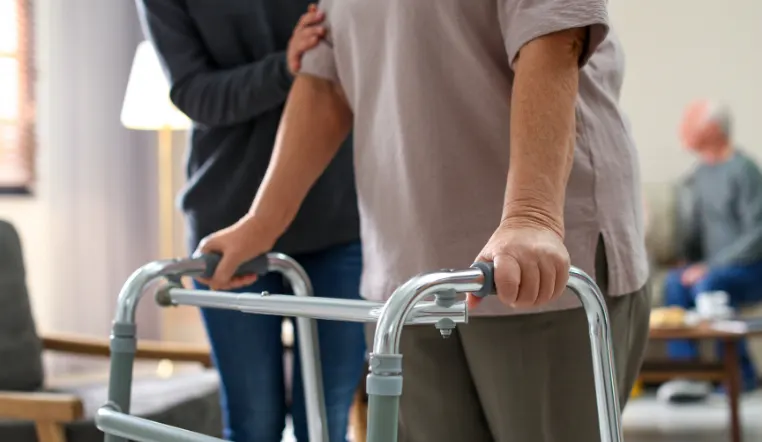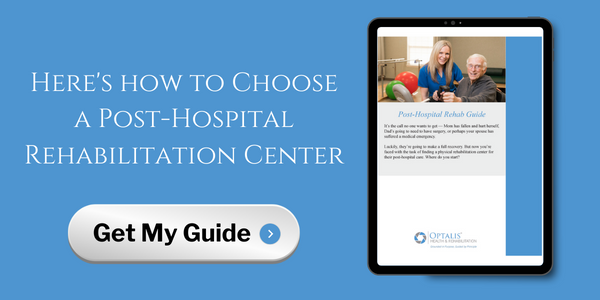You’ve been through the hospitalization process and the transition to rehab with your loved one. You’ve helped your parent navigate their recovery journey, and now they’re back on their feet and ready to return home.
So now what?
What Comes After Senior Living Rehab?
If you’re wondering what comes after your parent is discharged from a senior living rehab center, it’s important to remember that you aren’t going to be doing this on your own. The professional staff at the physical therapy center is there to help you through the process.
Chances are, you’ll have already discussed plans for discharge long before your parent is close to their discharge date. By the time your parent has completed their physical rehabilitation, a rehab center should already have a plan in place for how to best handle the transition for your parent.
_____________________________________________________________
Related: Why Discharge Rate Matters When Choosing a Rehab Center
_____________________________________________________________
For example, at Optalis post hospital rehab communities, discharge planning begins at the time of admission. When your parent arrives, a professional discharge planner will meet with you and your parent to get a sense of your parent’s needs. After a plan is in place for their rehab, the discharge planner will be able to get a better sense of what they’ll need after their stay in inpatient rehab.
While working with your parent’s interdisciplinary team of medical and therapy staff members, the discharge planner will determine your parent’s needs and current support system to provide a safe and smooth discharge to home experience.
Your parent might need a bit of help with things like transportation, lifting objects, and medication management. Depending on your parent’s needs, you might also need to hire some part-time help for things like home care and maintenance while they continue their recovery. It’s important to be as honest as possible during the entire process. Be open with the therapy team about how much time you will be able to devote to being your parent’s caregiver.
So in other words, the question of “what do I have to do after my parent’s stay in rehab?” will be answered for you by your parent’s therapy team. A good rehab center will walk you through the discharge process and help you with the transition, ensuring you aren’t left with unanswered questions when your parent is back at home.
Managing the Transition From Rehab to Home
When you’re helping a loved one transition from senior rehab to home, there are three basic things you will have to keep in mind: equipment, home safety, and healthcare needs.
When it comes to equipment, you can ask the therapy team what you might need. Next Step in Care, a resource for caregivers who are going through a transition like rehab-to-home, suggests you ask these questions to help get the answers you need:
- Will my family member require a cane, wheelchair, walker, special cushions, grab bars, or other assistive devices?
- Who will teach my family member and me to use them correctly?
- Does my family member need a hospital bed, shower chair, commode, oxygen supply, or other equipment or supplies? If so, where do I get these items?
- Will my family member’s insurance pay for them?
- My family member already has this (or similar) equipment at home. Can it be used again?
When it comes to healthcare needs, that will depend on your parent’s health situation. They might have a few light exercises to complete at home or might be on special medication from their illness or surgery. Again, this will be something the therapy team or your parent’s doctor will go over with you.
___________________________________________________________
Follow this list to get organized before the transition from rehab to home
___________________________________________________________
Home Assessment: What to Look for After a Post Hospital Rehab Stay
When your parent is going home after a stay in inpatient rehab, you’ll want to make sure the home is safe and properly set up for them. At Optalis communities, we offer a home assessment to our rehab patients before they transition to home.
For the home assessment, a therapist accompanies your loved one to their home and evaluates their home environment. While there, the therapist will be able to see how well your parent is able to maneuver throughout the house. After the visit, they’ll be able to make recommendations to you and your loved one about any changes or adjustments that may need to be made.
Here are some examples of what a therapist would look at during a home assessment visit:
- Maneuverability concerns such as door width, number of steps, and furniture arrangement.
- Safety concerns such as proper lighting, handrail stability and placement, fire extinguishers, and floor coverings.
- Accessibility concerns such as a hand held shower (if necessary), cabinet height, and closet organization.
Physical Therapy in Ohio and Michigan
If you live in Ohio or Michigan, Optalis has several convenient locations that offer post hospital rehab and physical therapy. If you have questions about senior rehab or would like to learn more about one of our care centers, contact us today.



